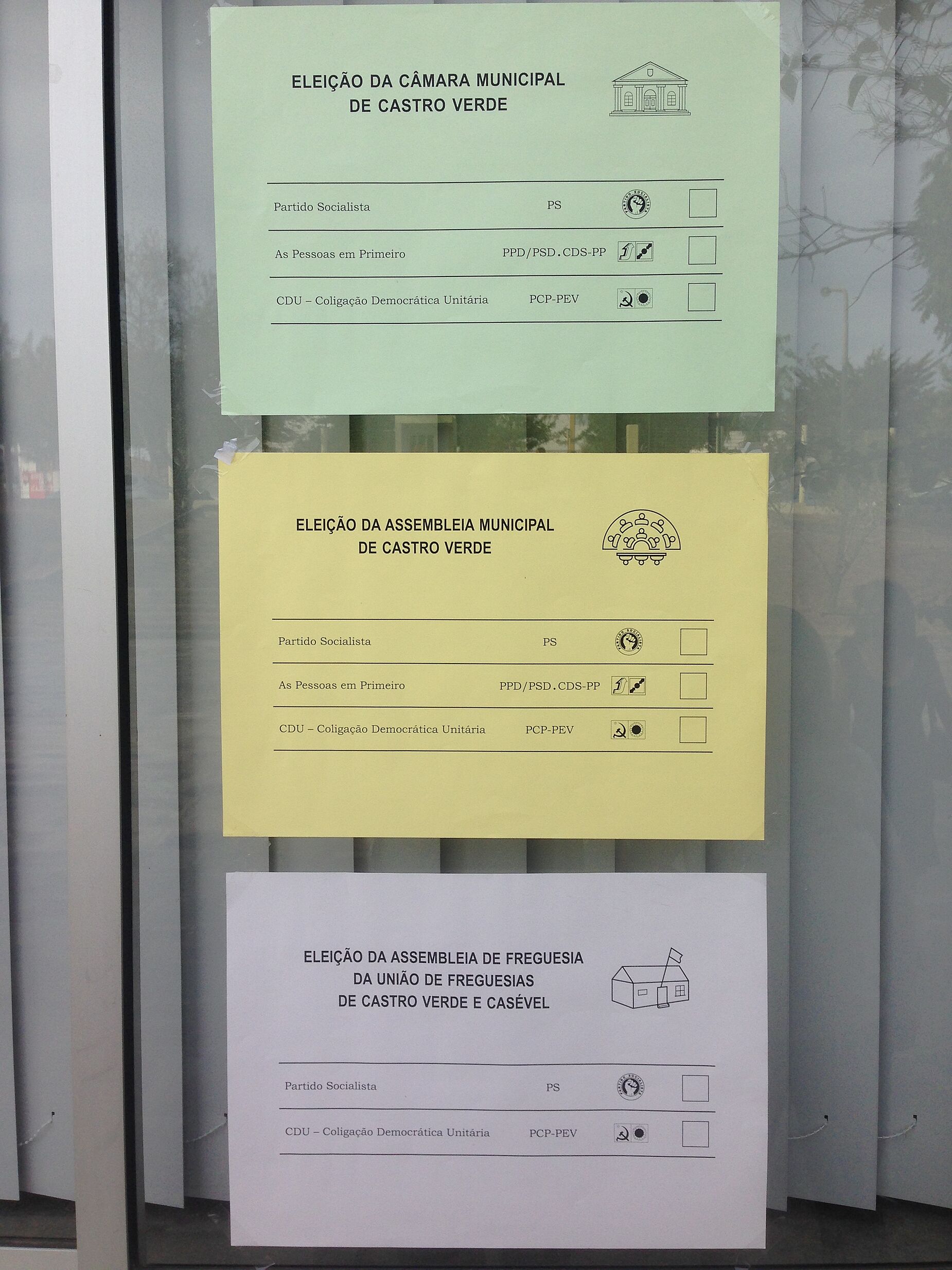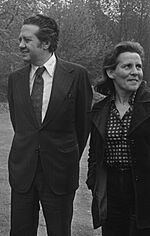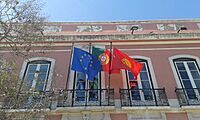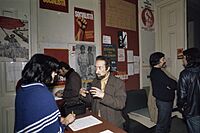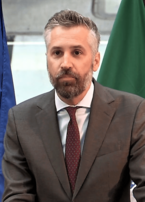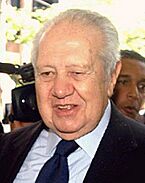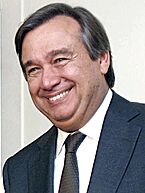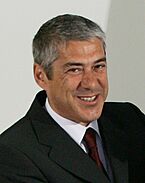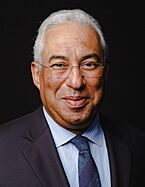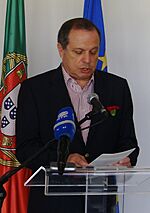Socialist Party (Portugal) facts for kids
Quick facts for kids
Socialist Party
Partido Socialista
|
|
|---|---|
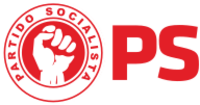 |
|
| Abbreviation | PS |
| President | Carlos César |
| Secretary-General | Pedro Nuno Santos |
| Founder | Mário Soares |
| Founded | 19 April 1973 |
| Legalized | 1 February 1975 |
| Preceded by | Acção Socialista Portuguesa |
| Headquarters | Largo do Rato 2, 1269–143 Lisbon |
| Newspaper | Acção Socialista |
| Student wing | Estudantes Socialistas |
| Youth wing | Socialist Youth |
| Women's wing | National Department of the Socialist Women |
| Membership (2022) | |
| Ideology | Social democracy |
| Political position | Centre-left |
| National affiliation | FRS (1980–1982) |
| European affiliation | Party of European Socialists |
| International affiliation |
|
| European Parliament group | Progressive Alliance of Socialists and Democrats |
| Trade union affiliation | General Union of Workers |
| Colours | |
| Anthem | A Internacional (The Internationale) |
| Assembly of the Republic |
78 / 230
|
| European Parliament |
8 / 21
|
| Regional Parliaments |
34 / 104
|
| Local government (Mayors) |
148 / 308
|
| Local government (Parishes) |
1,264 / 3,066
|
| Election symbol | |
|
|
|
| Party flag | |
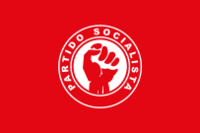 |
|
The Socialist Party (Portuguese: Partido Socialista, pronounced: [pɐɾˈtiðu susiɐˈliʃtɐ], PS) is a social-democratic political party in Portugal. It was founded on 19 April 1973 in the German city of Bad Münstereifel by militants who were at the time with the Portuguese Socialist Action (Portuguese: Acção Socialista Portuguesa). The PS is a member of the Socialist International, Progressive Alliance and Party of European Socialists, and has nine members in the European Parliament within the Progressive Alliance of Socialists and Democrats group during the 9th European Parliament. It was the governing party of Portugal between November 2015 and April 2024, subsequently winning the 2019 and 2022 legislative elections.
A party of the centre-left, the PS is one of the two major parties in Portuguese politics, its rival being the Social Democratic Party (PSD), a centre-right, conservative party. The current leader of the PS is Pedro Nuno Santos.
History
Portuguese Socialist Action (1964–1973)
The Portuguese Socialist Action (ASP) was founded in November 1964, in Geneva, Switzerland, by Mário Soares, Manuel Tito de Morais and Francisco Ramos da Costa. The ASP was founded in exile by several Socialist members as political organizations during Salazar's Estado Novo regime were forbidden. In 1964, Mário Soares was elected leader of the ASP and the core principles and values of the ASP were approved.
Inspired by May 68 events, the Socialist Party (PS) was created at a conference of the Portuguese Socialist Action (ASP) on 19 April 1973, in Bad Münstereifel in West Germany:
| Option | Votes | % | |
|---|---|---|---|
| In favour of a party | 20 | 74.1 | |
| Against a party | 7 | 25.9 | |
| Turnout | 27 | ||
| Source: | |||
The twenty-seven delegates decided to found a party of socialism and political freedom, making an explicit reference to a classless society and with Marxism as a source of principal inspiration. However, seven delegates voted against the idea of creating a party, including Mário Soares' wife Maria Barroso.
Socialist Party (1973–present)
On 25 April 1974, the Carnation Revolution brought down the authoritarian regime of the Estado Novo, established in 1933, and democracy was restored. Mário Soares, the party's General-Secretary, returned to Portugal after being in exile in France and became Minister of Foreign Affairs, and António de Almeida Santos was appointed Minister of Interjurisdictional Coordination in one of the first provisional governments. After the revolution, elections were called for 25 April 1975 and the PS won the 1975 election for the Constituent Assembly and the 1976 elections for the National Assembly, then losing to the Democratic Alliance (AD) in the 1979 legislative election. In 1980, the PS made an electoral alliance, called the Republican and Socialist Front (FRS), between the Independent Social Democrats (ASDI), led by Sousa Franco, and the Left-wing Union for the Socialist Democracy (UEDS), led by Lopes Cardoso. The alliance failed to defeat the AD.
They won the 1983 general election but without an absolute majority, and the PS formed a grand coalition with the centre-right Social Democratic Party (PSD), creating a Central Bloc. The new government began negotiations for Portugal to enter the European Economic Community (EEC). In 1985, the Central Block broke down and the PS, at the time led by António de Almeida Santos, lost the 1985 legislative election. Cavaco Silva's PSD won the 1985 elections, and again in 1987 and 1991 with an absolute majority. The PS was in opposition for more than ten years.
In the 1995 legislative election, the PS, then led by the already prominent António Guterres, won a general election for the first time in twelve years, and in the 1999 election failed to obtain what would have been a historic absolute majority for the party by only one MP. In 2001, after a massive defeat in the 2001 local elections, Guterres resigned as prime minister and called for new elections in 2002. The Socialist Party lost the 2002 general election by a small margin to the PSD, who formed a coalition government with the People's Party (CDS–PP). During this time, it has been argued that the Socialist Party moved towards the centre and adopted the Third Way.
In the early 2000s, the party cleaned up its membership database, resulting in a reduction of registered members from 120,000 in 2001 to 77,000 in 2002.
In June 2004, the PS won the 2004 European elections by a landslide, and a few weeks later, Durão Barroso, leader of the PSD and prime minister, resigned to become President of the European Commission. In December 2004, Jorge Sampaio, President of the Republic, called fresh elections for February 2005. These elections resulted in a landslide victory for the PS, winning for the first time since its foundation an absolute majority. José Sócrates, leader of the PS, became Prime Minister of Portugal.
In 2009, after 4+1⁄2 years in power, the PS lost the 2009 European Parliament elections to the PSD. However, they won the general election held on 27 September 2009 but failed to renew the absolute majority they won in the previous general election. The PS later introduced and legislated same-sex marriage. The Eurozone crisis and financial crisis of 2011 hit Portugal very hard, prompting Sócrates' government to impose harsh austerity measures. On 23 March 2011, the entire opposition in Parliament said no to new measures proposed by the government. As a result of this, Sócrates resigned as prime minister and a snap election took place on 5 June 2011. In the elections, the PS suffered a huge setback, with 28.1 percent of the vote, ten points behind the PSD, who formed another coalition government with the CDS–PP. Sócrates resigned as General-Secretary on election night after the PS's worst result since 1987. On 23 July 2011, António José Seguro was elected as Sócrates' successor.
Under the leadership of Seguro, the PS won the 2013 local elections making significant gains over the PSD and the Socialists again won the European elections in May 2014 but this time only just. They won 31.5 percent of the vote against almost 28% of the alliance between the PSD and CDS–PP. The result was considered quite a disappointment to many PS members and supporters and on 27 May António Costa, the then-mayor of Lisbon announced that he would stand for the leadership of the PS. Seguro refused to call a new congress and leadership election and instead called for a primary election, to be held on 28 September, to elect the party's candidate for prime minister in the 2015 general elections. Costa, being endorsed by the left faction of the party and people like Mário Soares, Ana Catarina Mendes and Pedro Nuno Santos, easily defeated Seguro, who was supported by the more moderate and centrist wing of the party, by a 67% to 31% margin.
In the 2015 legislative elections, the PS polled a disappointing second place, capturing just 32 percent of the votes against the 38.6 percent of the PSD/CDS–PP electoral alliance Portugal Ahead. Despite the victory of the PSD/CDS-PP coalition, the centre-left and left-wing parties achieved a clear majority in the Portuguese parliament. After the second Passos Coelho cabinet fell in parliament, with the approval of a no-confidence motion, the PS forged a confidence and supply agreement with Left Bloc and Unitary Democratic Coalition to support a PS minority government. For the first time in Portuguese democracy, the leader of the second most voted political force became prime minister.
In order to avoid bankruptcy due to mounting debt, in 2017, the party, alongside the PSD, the Portuguese Communist Party, BE and the ecologist party PEV, voted in favour of abolishing party fundraising limits, thereby opening all portuguese parties to private political donorship, that they are not obligated to disclose. The new proposal was reluctantly approved by the Portuguese president Marcelo Rebelo de Sousa.
Costa led a very successful first term as prime minister with a growing economy, low unemployment, and deficit cuts. Although he led a more left-leaning PS, Costa started to shift the party back to the centre in 2018, something that a younger and more left-wing faction, led by minister Pedro Nuno Santos, contested. In the 2019 European elections, the PS won a significant victory by achieving 33.4 percent, against the 22 percent of the PSD. The PS also won the October 2019 general election with 36 percent of the votes, against the 28 percent of the PSD, but by a closer margin than expected. The Second Costa cabinet was sworn in on 26 October 2019.
In October 2020, the PS lost power in the Azores region after the Socialists lost their majority in the region's 2020 October elections. The PS only got 39 percent of the votes, a drop of 7 pp, and 25 seats. The right-wing parties PSD, CDS, PPM, CHEGA, and IL won a majority of one seat over the whole left wing, and a few weeks after the election, they forged a deal that led the PSD to government. As of 2021[update], the PS is now in opposition in both autonomous regions of the country.
For the 2021 Portuguese presidential election, Costa endorsed the incumbent Marcelo Rebelo de Sousa, something that made some party members unsatisfied. Former PS MEP Ana Gomes, a critic of Costa and a member of the left faction of the party, ran for the presidency, declaring herself the candidate of democratic socialism and progressivism, stating that she has been disappointed with the leadership of the party for not having an official candidate. With the support of the left faction of the party and some more moderate members worried about corruption, Gomes finished in a disappointing second place behind de Sousa, who had many endorsements of party leaders like Lisbon's Mayor Fernando Medina, Eduardo Ferro Rodrigues, and Carlos César.
The party suffered a setback in the 2021 local elections by losing several cities to the PSD, but, the main defeat was the loss of Lisbon to the PSD candidate, Carlos Moedas, who defeated Fernando Medina by a narrow 34 to 33 percent margin. After the local elections, tensions between the PS and its left-wing allies, BE and CDU, led to the rejection of the 2022 budget which forced the calling of a snap election for January 2022. Despite polls predicting a close race between the PS and PSD, the Socialists won a surprise absolute majority, only the second in their history, with 41 percent of the votes against the 29 percent of the PSD, and winning 120 (52%) of the 230 seats in the Portuguese parliament.
In November 2023, António Costa resigned as Prime Minister and party leader following the Operation Influencer investigation, which investigates suspected corruption activities in the awarding of contracts for the lithium and hydrogen businesses. Following Costa's decision, an early election was called for 10 March 2024. A leadership election was called for 15 and 16 December 2023, which was won by Pedro Nuno Santos with almost 61 percent of the votes.
On the 10 March 2024 election, the Socialist Party was narrowly defeated by the Democratic Alliance (AD), headed by the Social Democratic Party, losing 42 seats and gathering 28 percent of the votes.
Ideology
The PS is a mainstream centre-left social democratic party with many internal factions, ranging from democratic socialism to social liberalism and centrism. It supports Keynesianism, Europeanism, and progressivism. Like many mainstream social democratic parties, it has previously adopted a Third Way outlook.
Election results
Assembly of the Republic
Seat share in the Portuguese legislative elections

| Election | Leader | Votes | % | Seats | +/- | Government |
|---|---|---|---|---|---|---|
| 1975 | Mário Soares | 2,162,972 | 37.9 (#1) |
116 / 250
|
Constituent assembly | |
| 1976 | 1,912,921 | 34.9 (#1) |
107 / 263
|
Minority | ||
| Coalition | ||||||
| Opposition | ||||||
| 1979 | 1,642,136 | 27.3 (#2) |
74 / 250
|
Opposition | ||
| 1980 | Republican and Socialist Front |
66 / 250
|
Opposition | |||
| 1983 | 2,061,309 | 36.1 (#1) |
94 / 250
|
Coalition | ||
| 1985 | António de Almeida Santos | 1,204,321 | 20.8 (#2) |
57 / 250
|
Opposition | |
| 1987 | Vítor Constâncio | 1,262,506 | 22.2 (#2) |
60 / 250
|
Opposition | |
| 1991 | Jorge Sampaio | 1,670,758 | 29.1 (#2) |
72 / 230
|
Opposition | |
| 1995 | António Guterres | 2,583,755 | 43.8 (#1) |
112 / 230
|
Minority | |
| 1999 | 2,385,922 | 44.1 (#1) |
115 / 230
|
Minority | ||
| 2002 | Eduardo Ferro Rodrigues | 2,068,584 | 37.8 (#2) |
96 / 230
|
Opposition | |
| 2005 | José Sócrates | 2,588,312 | 45.0 (#1) |
121 / 230
|
Majority | |
| 2009 | 2,077,238 | 36.6 (#1) |
97 / 230
|
Minority | ||
| 2011 | 1,566,347 | 28.1 (#2) |
74 / 230
|
Opposition | ||
| 2015 | António Costa | 1,747,685 | 32.3 (#2) |
86 / 230
|
Opposition | |
| Minority | ||||||
| 2019 | 1,903,687 | 36.3 (#1) |
108 / 230
|
Minority | ||
| 2022 | 2,302,601 | 41.4 (#1) |
120 / 230
|
Majority | ||
| 2024 | Pedro Nuno Santos | 1,812,443 | 28.0 (#2) |
78 / 230
|
Opposition | |
European Parliament
| Election | Leader | Votes | % | Seats | +/- |
|---|---|---|---|---|---|
| 1987 | Maria de Lourdes Pintasilgo | 1,267,672 | 22.5 (#2) |
6 / 24
|
|
| 1989 | João Cravinho | 1,184,380 | 28.5 (#2) |
7 / 24
|
|
| 1994 | António Vitorino | 1,061,560 | 34.9 (#1) |
10 / 25
|
|
| 1999 | Mário Soares | 1,493,146 | 43.1 (#1) |
12 / 25
|
|
| 2004 | António Costa | 1,516,001 | 44.5 (#1) |
12 / 24
|
|
| 2009 | Vital Moreira | 946,818 | 26.5 (#2) |
7 / 22
|
|
| 2014 | Francisco Assis | 1,033,158 | 31.5 (#1) |
8 / 21
|
|
| 2019 | Pedro Marques | 1,104,694 | 33.4 (#1) |
9 / 21
|
|
| 2024 | Marta Temido | 1,268,915 | 32.1 (#1) |
8 / 21
|
Regional Assemblies
| Region | Election | Leader | Votes | % | Seats | +/- | Government |
|---|---|---|---|---|---|---|---|
| Azores | 2024 | Vasco Cordeiro | 41,538 | 35.9 (#2) |
23 / 57
|
Opposition | |
| Madeira | 2024 | Paulo Cafôfo | 28,981 | 21.3 (#2) |
11 / 47
|
Opposition |
List of lead party figures
Secretaries-General
- Mário Soares: 19 April 1973 – 29 June 1986
- António de Almeida Santos (ad interim): 13 June 1985 – 13 November 1985
- António Macedo (ad interim): 13 November 1985 – 29 June 1986
- Vítor Constâncio: 29 June 1986 – 16 January 1989
- Jorge Sampaio: 16 January 1989 – 23 February 1992
- António Guterres: 23 February 1992 – 19 January 2002
- Eduardo Ferro Rodrigues: 19 January 2002 – 27 September 2004
- José Sócrates: 27 September 2004 – 23 July 2011
- António José Seguro: 23 July 2011 – 28 September 2014
- Maria de Belém Roseira (ad interim): 28 September 2014 – 22 November 2014
- António Costa: 22 November 2014 – 7 January 2024
- Pedro Nuno Santos: 7 January 2024 – present
Graphical timeline
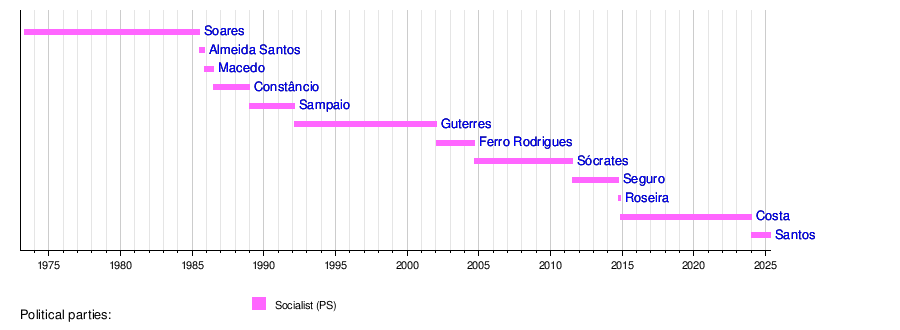
-
Mário Soares, founder, Prime Minister (1976–1978, 1983–1985), and President (1986–1996).
-
António Guterres, Prime Minister from 1995 to 2002 and the 9th Secretary-General of the United Nations.
-
José Sócrates, the party's Secretary-General (2004–2011) and Prime Minister (2005–2011).
-
António Costa, the party's Secretary-General (2014–2024) and Prime Minister (2015–2024).
Party presidents
- António Macedo: 19 April 1973 – 29 June 1986
- Manuel Tito de Morais: 29 June 1986 – 14 January 1989
- João Ferraz de Abreu: 14 January 1989 – 21 February 1992
- António de Almeida Santos: 21 February 1992 – 9 September 2011
- Maria de Belém Roseira: 9 September 2011 – 29 November 2014
- Carlos César: 29 November 2014 – present
Presidents of the Assembly
- Henrique de Barros: 3 June 1975 – 2 April 1976
- Vasco da Gama Fernandes: 29 July 1976 – 29 October 1978
- Teófilo Carvalho dos Santos: 30 October 1978 – 7 January 1980
- Manuel Tito de Morais: 8 June 1983 – 24 October 1984
- António de Almeida Santos: 31 October 1995 – 4 April 2002
- Jaime Gama: 16 March 2005 – 21 June 2011
- Eduardo Ferro Rodrigues: 23 October 2015 – 29 March 2022
- Augusto Santos Silva: 29 March 2022 – 25 March 2024
Parliamentary Leaders
- António Lopes Cardoso (Beja): 1975–1976
- Salgado Zenha (Porto): 1976–1983
- Walter Rosa (Lisbon): 1983–1985
- José Luís Nunes (Porto): 1985–1986
- João Ferraz de Abreu (Aveiro): 1986–1987
- Jorge Sampaio (Lisbon): 1986–1988
- António Guterres (Castelo Branco): 1988–1991
- Jaime Gama (Lisbon): 1991–1994
- António de Almeida Santos (Porto): 1992–1993
- Jorge Lacão (Santarém): 1995–1996
- Francisco Assis (Porto): 1997–2002, 2009–2011
- António Costa (Leiria): 2002–2003
- António José Seguro (Lisbon): 2004
- Alberto Martins (Porto): 2005–2009, 2013–2014
- Maria de Belém Roseira (Lisbon): 2011
- Carlos Zorrinho (Évora): 2011–2013
- Eduardo Ferro Rodrigues (Lisbon): 2014–2015
- Carlos César (Azores): 2015–2019
- Ana Catarina Mendes (Setúbal): 2019–2022
- Eurico Brilhante Dias (Leiria): 2022–2024
- Alexandra Leitão (Santarém): 2024 - present
Prime Ministers
- Mário Soares: 23 July 1976 – 28 August 1978; 9 June 1983 – 6 November 1985
- António Guterres: 28 October 1995 – 6 April 2002
- José Sócrates: 12 March 2005 – 21 June 2011
- António Costa: 26 November 2015 – 2 April 2024
Presidents of the Republic
- Mário Soares: 9 March 1986 – 9 March 1996
- Jorge Sampaio: 9 March 1996 – 9 March 2006
See also
- Politics of Portugal
- Socialist Party


